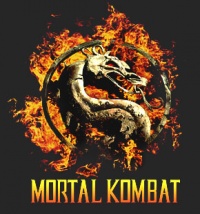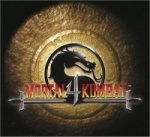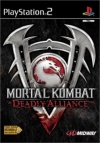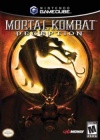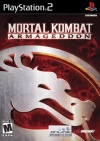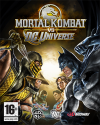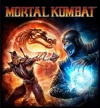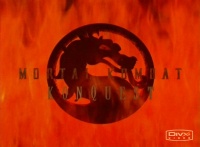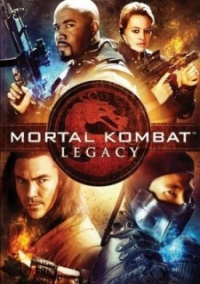Mortal Kombat
Mortal Kombat is a series of fighting video games created by Ed Boon and John Tobias in 1992. The series was originally developed and produced by Midway Games as an arcade game, and was later launched for home systems Sega Genesis and Super Nintendo Entertainment System (SNES) in 1993 by Acclaim Entertainment. Over the following years, the Mortal Kombat series has continued releasing new games for newer home systems such as the Nintendo64, Nintendo Gamecube, Xbox 360, Playstation 2, and Playstation 3. There has been some ethical controversies over the graphic and violent nature of the gameplay, but the Mortal Kombat series has still maintained fans for over two decades and has also inspired the production of comic books, animated shows, and live-action films.
Contents
History of Mortal Kombat
There are nine main Arcade-style iterations in the Mortal Kombat Franchise[1].
1. Mortal Kombat I.
- General Release Date: October 8th, 1992
- Number of Selectable, Default, Players: 7
- Genre: Versus Fighting
- Mode(s) of playing the Game: Up to 2
- Number of Boss-Characters that participant has to defeat to conquer, or Win, the entire Game: 2
- Publisher: Midway
2. Mortal Kombat II.
- General Release Date: 1993
- Number of Selectable, Default, Players: 12
- Genre: Versus Fighting
- Mode(s) of playing the Game: Up to 2
- ^ 1-Player (Human) versus Computer-controlled Opponent
- ^ 1-Player (Human) versus another, but different, Player (Human)
- Publisher: Midway
- Number of Boss-Characters that participant has to defeat to conquer, or Win, the entire Game: 2
3. Mortal Kombat 3
- General Release Date: 1995
- Number of Selectable, Default, Players: 14
- Genre: Versus Fighting
- Mode(s) of playing the Game: Up to 2
- ^ 1-Player (Human) versus Computer-controlled Opponent
- ^ 1-Player (Human) versus another, but different, Player (Human)
- Publisher: Midway
- Number of Boss-Characters that participant has to defeat to conquer, or Win, the entire Game: 2
4. Mortal Kombat 4
- General Release Date: 1997
- Number of Selectable, Default, Players: 15
- Genre: Versus Fighting
- Mode(s) of playing the Game: Up to 2
- ^ 1-Player (Human) versus Computer-controlled Opponent
- ^ 1-Player (Human) versus another, but different, Player (Human)
- Number of Boss-Characters that participant has to defeat to conquer, or Win, the entire Game: 1
- Publisher: Midway Games
- --> Important Note: This particular Mortal Kombat game was the last of Mortal Kombat games to be released as an Arcade Game. After Mortal Kombat 4, all future Mortal Kombat games would be released exclusively as Console-game System games only.
5. Mortal Kombat: 5 (also known as Mortal Kombat: Deadly Alliance)
- General Release Date: November 20, 2002
- Number of Selectable, Default, Players: 12
- Genre: Versus Fighting
- Mode(s) of playing the Game: Single Player or Multi-Player (the latter in-person or online, see below)
- ^ 1-Player (Human) versus Computer-controlled Opponent
- ^ 1-Player (Human) versus another, but different, Player (Human)
- Publisher: Midway
- Number of Boss-Characters that participant has to defeat to conquer, or Win, the entire Game: 2
6. Mortal Kombat 6 (also known as Mortal Kombat: Deception)
- General Release Date: October 4, 2004
- Number of Selectable, Default, Players: 12
- Genre: Versus Fighting
- Mode(s) of playing the Game: Up to 2 plus online game play
- ^ 1-Player (Human) versus Computer-controlled Opponent
- ^ 1-Player (Human) versus another, but different, Player (Human)
- Publisher: Midway
- Number of Boss-Characters that participant has to defeat to conquer, or Win, the entire Game: 2
7. Mortal Kombat 7 (also known as Mortal Kombat: Armageddon)
- General Release Date: October 11th, 2006
- Number of Selectable, Default, Players: 54
- Genre: Versus Fighting
- Mode(s) of playing the Game: 1 to 8 players plus online game play
- ^ 1-Player (Human) versus Computer-controlled Opponent
- ^ 1-Player (Human) versus another, but different, Player (Human)
- Number of Boss-Characters that participant has to defeat to conquer, or Win, the entire Game: 1
- Publisher: Midway
8. Mortal Kombat 8 (also known as Mortal Kombat versus DC Universe)
- General Release Date: November 16, 2008
- Number of Selectable, Default, Players: 15
- Genre: Versus Fighting
- Mode(s) of playing the Game: Up to 2 Players plus online game play
- ^ 1-Player (Human) versus Computer-controlled Opponent
- ^ 1-Player (Human) versus another, but different, Player (Human)
- Publisher: Midway Games
- Number of Boss-Character[s] that participant has to defeat to conquer, or Win, the entire Game: unknown and/or n/a
9. Mortal Kombat 9 (also known as Mortal Kombat; also known as number 2 as Mortal Kombat-2011)
- General Release Date: April 19th, 2011
- Number of Selectable, Default, Players (Arcade-Mode [or Tournament-ladder mode]): 25 and Number of Selectable, Default, Players (Story Mode): 16.
- Genre: Versus Fighting
- Mode(s) of playing the Game: 1-8 Players (online play) and 1-4 Players (offline play)
- Publisher: WB Games Chicago
- Number of Boss-Characters that participant has to defeat to conquer, or Win, the entire Game: 2
Fatalities
After a player is drained from their health, they will appear in a dazed state where the other player can perform a fatality. A fatality is when a character performs a special move, as in Sub-Zero's "spine rip" fatality, where he rips the spine out of the other character. Each character has his or her own special fatality that results in a gruesome action.
Characters
- Goro: The boss and playable character. He is part of the half-human, half-dragon race called the Shokan and has four-arms.
- Johnny Cage: A playable character. He real name is John Carlton and is a film actor who enters the tournament.
- Kano: A playable character. The leader of the Black Dragon criminal empire.
- Liu Kang: A playable character. A Shaolin monk who enters the tournament to save his world.
- Raiden: A playable character. The thunder god and protector of Earthrealm.
- Reptile: A hidden boss. He is a Raptor and serves Shao Kahn.
- Scorpion: A playable character. He is a dead warrior who enters the tournament to kill Sub-Zero.
- Shang Tsung: A playable character. He is a sorcerer and a shapeshifter who absorbs the souls of the dead.
- Sonya Blade: A playable character. She is an officer of the United States Special Forces.
- Sub-Zero: A playable character. He is an assassin with the ability to control ice.
Ethical Implications of the Game
Upon the release of Mortal Kombat, the game was controversially critiqued by many parents and public officials to the games graphics of gore and violence. Such violence includes ripping the heart or spine out the opponent's body, or setting an opponent on fire. The game is rated M for Mature, however, children and teenagers can easily obtain access to the game. Thus, they can be exposed to the high levels of gore and violence present in the game. Mortal Kombat, along size several other videogames, was used as a primary example in hearings led by two senators as to why there should be a videogame rating system. The result was the Entertainment Software Rating Board (ESRB), which created a rating system from early childhood (eC) to adult only (AO)[2].
There is also the fear that people will try to re-capture the events simulated in the film, a fight to the death. Also, the phrase "mortal kombat" has taken on a new meaning for many people, often referred to when implying a fight to the death.
Films
On August 18, 1995, New Line Cinema released a film adaption of the video game titled, Mortal Kombat. The film follows Liu Kang, Johnny Cage, and Sonya Blade as they fight through the tournament in hope to defeat Shang Tsung and save the world. The film was based on the first Mortal Kombat and Mortal Kombat II. The second film in the series was released on Novemeber 21, 1997 titled, Mortal Kombat: Annihilation. The film follows Liu Kang and other allies to stop the evil emperor, Shao Kahn, from opening the portal from Outworld to the Earthrealm. The film was based on Mortal Kombat 3.
Here is the cast for the 1995 movie Mortal Kombat main characters:[3]
- Liu Kang played by Robin Shou
- Johnny Cage played by Linden Ashby
- Sonya Blade played by Bridgette Wilson-Sampers
- Lord Rayden played by Christopher Lambert
- Shang Tsung played by Cary-Hiroyuki Tagawa
- Scorpion played by Chris Casamassa
- Sub Zero played by François Petit
- Kano played by Trevor Goddard
- Kitana played by Talisa Soto
Here is the cast of main characters for the 1997 movie Mortal Kombat: Annihilation: [4]
- Liu Kang played by Robin Sou
- Kitana played by Talisa Soto
- Lord Rayden played by James Remar
- Sonya Blade played by Sandra Hess
- Jax played by Lynn 'Red' Williams
- Shao-Kahn played by Brian Thompson
- Shinnok played by Reiner Schöne
- Johnny Cage played by Chris Conrad
- Cyrax/Scorpion played by J.J. Perry
- Nightwolf played by Litefoot
- Sindel played by Musetta Vander
TV Series
Mortal Kombat: Konquest
Mortal Kombat: Konquest (also released as Mortal Kombat: Conquest) is an American martial arts television series that aired for one season from 1998 to 1999, and was based on the popular Mortal Kombat fighting game series. The program was filmed at Disney's Hollywood Studios in Orlando, Florida.
Storyline
"In each of us there burns a soul of a warrior. In every generation a few are chosen to prove it. Centuries ago, in a time of darkness and fury, that fate befell three strangers. A monk, Kung Lao; an exiled guard, Siro; and a thief, Taja, who have to defend our realm from the forces of Outworld. By fighting for their lives, by fighting for their honor and by fighting for their realm...in a tournament called Mortal Kombat."
Many centuries ago, Earth was an enchanting and desirable planet. Powerful and rich with natural resources, the vicious megalomaniac Shao Kahn wanted Earth as part of his growing collection of conquered realms known as Outworld. To protect Earth, Mortal Kombat, a tournament in which the fate of the planet is decided in battles between competitors from Earthrealm and Outworld, was created. Five hundred years in the past, the monk warrior Kung Lao defeated Shao Kahn's sorcerer, Shang Tsung. When Kung Lao spared his life, Kahn imprisoned Tsung in the cobalt mines. Kung Lao now had to train the next generation of warriors, who would give their lives to save Earth. Kung Lao creates a partnership and friendship with two warriors: Siro, a former bodyguard, and Taja, an ex-thief. In the mysterious city of Zhuzin, Kung Lao and his new friends are guided and watched over by the thunder god Raiden. The three now battle various evils of both Outworld and Earthrealm, including an imprisoned Tsung, who swore eternal revenge on Kung Lao for his humiliating defeat, and the sultry and seductive Vorpax, who is also imprisoned in the mines and has an agenda of her own.
Mortal Kombat Legacy
Mortal Kombat: Legacy is an American web series anthology adaptation of the fictional universe of the Mortal Kombat video game franchise that debuted on Machinima.com's YouTube channel on April 11, 2011.[1] The show's premise originated with director Kevin Tancharoen's short film entitled Mortal Kombat: Rebirth, portraying the original game's story in a realistic way, a concept he eventually submitted to Warner Bros. Seeking the green-light from the studio for production on a re-imagined Mortal Kombat film.[2] Warner Bros. declined to back the film, despite the attention and positive fan reception,[3][4] but Tancharoen did receive the go-ahead to shoot the web series.[5] Mortal Kombat: Legacy takes place before the events of the original game and tells the background stories of several characters from the franchise, culminating in their reasons for participating in the upcoming tenth Mortal Kombat tournament, on which the first game was based. The episodes in the anthology web series are non-linear with minimal continuity, and each devoted to the story of a specific character or characters.
See Also
External Links
References
- ↑ Mortal Kombat Wiki
- ↑ Videogame Makers Propose Ratings Board to Congress, 29 July 1994 wired.com
- ↑ IMDB: Mortal Kombat
- ↑ IMDB: Mortal Kombat Annihilation
